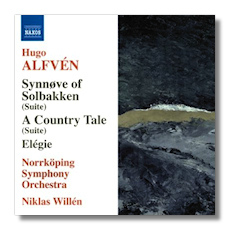
The Internet's Premier Classical Music Source
Related Links
- Latest Reviews
- More Reviews
-
By Composer
-
Collections
DVD & Blu-ray
Books
Concert Reviews
Articles/Interviews
Software
Audio
Search Amazon
Recommended Links
Site News
 CD Review
CD Review
Hugo Alfvén

Film Music
- Synnøve Solbakken: Suite
- En Bygdesaga: Suite
- Elégie (At Emil Sjögren's Funeral)
Norrköping Symphony Orchestra/Niklas Willén
Naxos 8.557828 DDD 73:12
Like many classical composers from the century just past, Hugo Alfvén padded his bank account from time to time by writing music for films. Lest any readers look down on that practice, consider that, then as now, more people go to movie theaters than to concert halls, and if a composer wants his music to be heard by a lot of people, films can be a fine "delivery system." A good director will let the composer do what he thinks is best, and one hardly feels that Alfvén was constrained in his scores to Synnøve of Solbakken (1934) and A Country Tale (1945). In fact, in both cases, Alfvén's music was deemed superior to the film itself.
Synnøve, based on a novel by Norwegian writer Bjørnstjerne Bjørnson, was a joint production of Sweden and Norway. The title character is a country lass who loves Torbjörn, the scion of a rival family. In the end, after the usual trials and tribulations, the families reconcile, the two lovers are allowed to marry, and everyone lives happily ever after. Assisted by Eduard Hladisch, Alfvén prepared a six-movement suite from the film's many cues, and the result is heard here. The music is unsophisticated, in the very best sense of the word. Given the film's setting, there is the unsurprising use of Norwegian folk tunes, and indeed, Edvard Grieg seems not very far away much of the time.
En Bygdesaga (also known as Mans Kvinna, or "Man's Woman") is based on a novel by Vilhelm Moberg. Here we have a rural love triangle, with Märit married to the farmer Påvel, but in love with the younger farmer Håkan. Consumed with jealousy, Påvel locks Märit away, as if she were his property (thus the title), but she escapes, and she and Håkan run off together. Again, a six-movement suite was prepared. As befits the subject matter, the music is darker, and more reminiscent of Alfvén's symphonies than the music for Synnøve. Nevertheless, the underlying pastoral mood ensures it goes down quite easily, and the score's emotional changeability is an asset, not a liability. One is unlikely to be bored or bludgeoned.
The bonus is an Elégie originally composed for the play Vi ("We") and taken from the orchestral suite Gustav II Adolf. Sjögren was an organist and composer from the generation before Alfvén's. This tone poem is larger than its name might suggest. It begins solemnly, with the air of a funeral march, and there are episodes of almost Mahlerian anguish, but there are less forbidding ones too, and they provide both solace and contrast.
Willén and the Norrköping Symphony Orchestra made an excellent impression a few months ago with their disc of Alfvén's Fifth Symphony (Naxos 8.557612 B000M2DNS2). The music-making here is no less satisfying, and now there are even fewer alternatives. (Willén has recorded all of Alfvén's symphonies for this label, and one hopes that he now will turn his attention to the other orchestral works.) The Norrköping Symphony Orchestra has been around since 1912, and has had both Herbert Blomstedt and Franz Welser-Möst as principal conductors at different times. It is one of Sweden's very best orchestras.
The engineering is excellent, and Richard Whitehouse, Naxos' stalwart annotator, tells us what we want to know in the booklet note. This is a worthwhile release.
Copyright © 2007, Raymond Tuttle




















